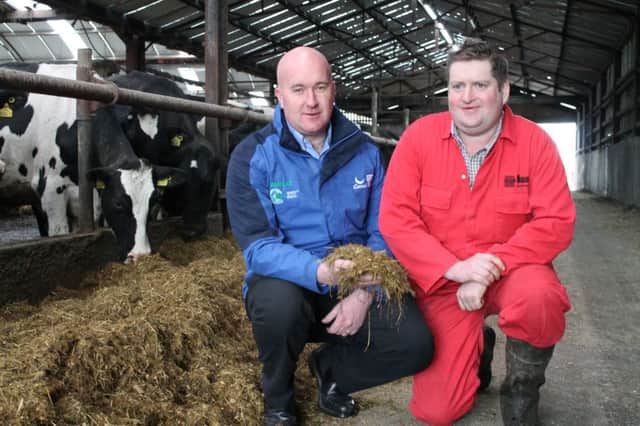Powerstart '“ tried, tested and trusted


One aspect that should not be eliminated is the silage additive – it will more than pay for itself through fewer losses in the crop and the increased production will add to the profit margin.
However, it is important to ensure that the additive chosen has been well proven in all situations – research, on farm experience and in all weather conditions.
Advertisement
Hide AdAdvertisement
Hide AdFirstly, the fewer losses in the crop. Stephen Lavery, Genus ABS explains: “During the fermentation process there are losses of CO2 and water and these can account for 5-10% of your silage. The silage additive will pay for itself by reducing these losses, providing additional silage at feed-out which will more than cover the initial outlay costs.”
Regarding increased production Stephen points out that the old concept of only using a silage additive when weather conditions are poor does not hold up when you look at the research and experience with Powerstart.
Ideal crops with high sugar, good protein and digestibility have more nutrients to lose than mature later cut crops. It is counter productive to lose some of these valuable nutrients during the ensiling process in order to save the cost of an additive.
If the weather conditions or ground conditions make the ensiling process more challenging research has shown that Powerstart will still be effective.
Advertisement
Hide AdAdvertisement
Hide AdStephen Lavery explains that Powerstart contains a unique strain of Lactobacillus which means it is able to make better use of all the sugars available in grass, which results in a more rapid fermentation with two significant consequences for the nutritional value of the silage.
The first is that by making use of all the sugars in grass, less of the available sugar is used during the fermentation which means that there is more sugar in the resultant silage and available to the cow.
The second is that by accelerating the rate of fermentation the protein in the grass is preserved more effectively with a higher proportion of true protein and fewer free amino acids, something that will not show up on a silage analysis.
And this is where the final unique benefit of Powerstart is evident. In silages with more free amino acids a large proportion of protein is lost as rumen ammonia which is excreted as urea into the blood and milk.
Advertisement
Hide AdAdvertisement
Hide AdConverting ammonia into urea wastes energy which reduces the energy available for milk production. If less energy is available from the diet, the consequence in early lactation is that cows will be in extended negative energy balance and will lose more condition over a longer period of time which is well understood to have a negative effect on fertility, another aspect which can impact on profit margins.
Finally, a word on application rate of inoculants – to work properly there is a lot of independent evidence that shows that under UK conditions inoculants must apply one million bacteria for every gramme of grass.
Why? - When we apply one million bacteria, it is like having a head start, as we race to the fermentation finish line, less obstacles appear in front of us and the race is quickly won. If we have a lower dose rate, more obstacles appear and the finish line is moved further away.
The obstacles are undesirable microorganisms that take the sugar we need for the fermentation, while the protein breakdown products such as ammonia put the finishing line back because these neutralize the acid being produced and so more acid is required before the fermentation is stable.
For further details contact Stephen Lavery on 077 6805 8450 or your local Genus ABS representative.